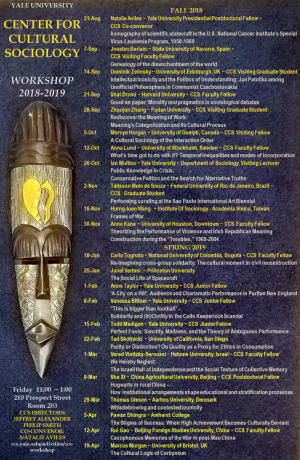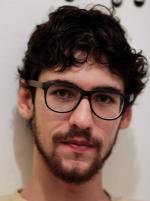|
Yale University. CCS Workshop Co-Convener & Presidential Postdoctoral Fellow in the Department of Sociology
|
|
State University of Navarre, Spain. CCS Visiting Faculty Fellow
|
|
University of Edinburgh, United Kingdom. CCS Visiting Graduate Student
Abstract: This paper explores the phenomenon of iconic intellectuals, exemplified by the life trajectory of Czech phenomenologist Jan Patočka who rose to prominence during the late 1960s and the 1970s. As I demonstrate, Patočka’s iconic position within the milieu of dissident thinkers was an outcome of a complex nexus of factors among which the most prominent were his charismatic performative capacity, which drew on his outstanding conduct of exclusive cultural patterns, production of symbols that resonated deeply with nonconformist life in a communist country, as well as his reorientation from academic philosophy to political action. His death, which closely followed his political activisation, became a crucial moment for the Charter and launched a long process of consecration that established the philosopher as one of the central figures not only in Czech philosophy, but also history in general sense.
|
|
Harvard University. CCS Faculty Fellow
Samuel Stabler
Hunter College.
|
|
Fudan University, China. CCS Visiting Graduate Student
|
|
University of Guelph, Canada. CCS Visiting Fellow
|
|
University of Stockholm, Sweden. CCS Faculty Fellow
Abstract: The migration ”crisis” of recent years and decades-long concerns about ”failures of integration” are prompting a retreat from multiculturalism as well as from human rights values. There is a well-developed body of research on incorporation of migrants, but at the current moment one key aspect of incorporation is being overlooked: time. Drawing upon qualitative material, I consider temporal modes of incorporation in which time must inform our understanding of how the relation between migrants and the new society will develop. Time is a key element of the experience of migrants from the very outset, while they await a decision on their asylum application. Temporal distances between societal groups shape the belonging and inclusion of migrants in the new society. Periods of significant migration reshape the host society and change the scope of individual action. Migration research and societies experiencing recent migration benefit from the incorporation of a temporal perspective.
|
|
Yale University. Lecturer, Department of Sociology
|
|
Federal University of Rio de Janeiro, Brazil. CCS Visiting Graduate Student
|
|
Academia Sinica, Taiwan. Currently Visiting Scholar at the Harvard-Yenching Institute
|
|
University of Houston, Downtown. CCS Faculty Fellow
Abstract: This paper presents an initial (and incomplete) introductory chapter to a monograph study of meaning construction during the Northern Irish armed conflict, 1969-1998. Specifically, the project proposes a strong cultural sociology analysis of the transformation of the Northern Irish Nationalist community over the thirty-year armed conflict known as the “Troubles,” and the contribution of Irish Republican Army (IRA) and movement operations and discourse to that transformation. The theoretical framework is rooted in Alexander’s Civil Sphere theory to explain the reemergence of the IRA in 1969, the conditions for violence, and the construction of a nationalist “counterpublic” over the long span of the conflict. Alexander’s model of Cultural Pragmatics is employed to analyze Republican violence in its many forms as political performance. The interpretive framework for analyzing meaning construction and transformation over the course of the historical event, the Troubles, is based on Sewell’s Eventful Temporality.
|
|
Department of Sociology and Center for Social Studies, National University of Colombia, Bogotá. CCS Faculty Fellow
Abstract: Generalized solidarity is an important dimension of the civil fabric of society. Deep socio-political divisions and extreme polarization, though, may erode it at two levels. They may hinder social action geared to establish cross-group solidarities among citizens from different camps. And they may even go as far as making cross-group solidarities unimaginable to them. When this occurs, an agenda of civil reconstruction must necessarily include a distinctive cultural moment. Members of society from different socio-political groups, in other words, must be drawn to reimagine the possibility of solidarizing with each other. In this paper, I will show how cultural sociologists may contribute to this by engaging in narrative intervention and by pushing further ahead along the so-called local turn in peacebuilding.
|
|
Princeton University
Abstract: How is social organization implicated in the conduct, practice, and outcomes of science? I present empirical results from a long term comparative ethnographic study of two teams of planetary scientists who operate robotic spacecraft to conduct their collaborative investigations. To make decisions and negotiate among themselves for spacecraft time and resources, one team deploys a flat social form whose decision-making is characterized by collectivism and interdependence, while the other works in a matrixed hierarchy and negotiates under principles of fairness and subgroup autonomy. I describe the contrasting practices, interaction rituals, and forms of talk by means of which decisions are made on these two teams, and show how these elements shape the kinds of scientific results that are generated or avoided. I then describe how the scientific products that are shaped by this work return as inputs to the organization, in a mechanism I call an iterative loop. This creates ever tighter coupling between organizational process and product and forges strong ties between organizational form and scientific outcomes.
|
|
Yale University. CCS Junior Fellow
|
|
Yale University. CCS Junior Fellow
|
|
Yale University. CCS Director
This book manuscript is in press with Polity. Except in one respect, it is an enlarged version of my article on societalization that ran in the December ASR. The exception is a new chapter on #MeToo.
This is the “paper” that I offer for this Friday’s workshop. Because I never intended it to be a Workshop topic, I’m afraid that the regular rule of a not-in-press/not published draft has to be suspended. That said, the book is being copy-edited right now, and I can change some smaller things. That doesn’t mean strong query and criticism are out of order. I look forward to discussing with you all the theoretical and empirical (and possibly the political) issues the chapter raises. And, if you want to talk about anything else in the rest of the book, fine with me.
|
|
University of North Carolina, Greensboro.
Abstract: The study of consumption, despite some superficial gestures, has not sufficiently reckoned with its history, role, and form in capitalist societies. Through a comparative historical genealogy of the contemporary tendency to treat quality as a proxy for ethics in consumption, I propose a way to identify continuity, not just change, in ethical consumption. When we assess the purity claims of early consumer activists, we stand to reveal the processes through which ethics and quality find themselves associated. Drawing on the historical cases of late eighteenth century abolitionists and turn-of-the-twentieth-century consumer activists, I explore how these activists participated in an ongoing civil project to purify consumption by relating a) the treatment of the laborers, b) the quality of the labor, and c) the quality of the goods.
|
|
Hebrew University of Jerusalem, Israel. CCS Faculty Fellow
|
|
Yale University. CCS Postdoctoral Fellow
Abstract: This paper offers an account of “Hogwarts schooling” in H County over seven years. After the initiation of the School-Mapping Policy, the radical reforms of shutting down rural schools at composory educational stage in China, massive rural students were not only been pushed into bigger boarding schools but also been pushed into county/city-level schools faster. For many of those who experienced fast-expanding and long-time boarding education, the long missing of primary group caring in schools stimulates abundant student subcultures and in turn “created” more “problematic” students to be schooled longer and harder. Although scholarly attention had already been made a lot on the School-Mapping Policy, almost all of them were written at the peak of it, and we know little about its long recent influences. Among literatures noticed the thriving student subcultures emerged in “Hogwarts schools”, either of them stigmatizes school subcultures or directly applies Paul Willis’ conclusion in Learning to Labor with Chinese context, interpretating that disadvantaged students in China also reflexively produced anti-schooling subcultures which ironically paved their way to the underclass like their parents. A big discrepcy laid in explaining why some have failed and some other disadvantaged students were successful at school at the same time. I concluded in this article that without the cultural understanding that it is the binarical meaningful attchment a student made during struggling in his/her social network, which fuels/demotivates their academic interest, there will be contiously one-sided subculture thinking or discoherent cultural explanations deviants the outcomes of the educational policy from its initially good intensions.
|
|
Aarhus University, Denmark
Abstract: The paper theorizes the whistleblower as a distinct, secular hero type in Western democracy. The whistleblower’s disclosure of wrongdoing is surrounded by doubt, crisis, and retaliation. The act is seen as heroic because the whistleblower sacrifices stability, career, and security to achieve a collective good. Drawing on Joseph Campbell’s and Vladimir Propp’s work on mythology and fairy tales, I argue that the process from the discovery of wrongdoing, over doubts and retaliation, to public disclosure can be thought of as a journey with five thresholds that all must be crossed before heroic status is awarded. I employ Jeffrey Alexander’s concept of the civil sphere to argue how the whistleblower hero’s journey resonates in secular democracies. To illustrate the theoretical frame, I provide an in-depth analysis of eight whistleblower films. Cinematic dramatizations offer a unique and unexplored material to identify the heroizing meanings associated with whistleblowers in Western democracies.
|
|
Amherst College
|
|
Yale University. CCS Junior Fellow
|
|
University of Bristol, UK. CCS Faculty Fellow
Abstract: Focussing on the events of the 2017 general election and the period leading up to it, this paper interrogates the cultural logic of Corbynism. It demonstrates the active cultural work that went into the coding and counter-coding, narrativization and counter-narrativization, of various events, issues, and figures. It stresses how the underlying binary structures of the British civil sphere within which this work took place affected and constrained such work, sometimes producing consequences unintended by the cultural workers themselves. It therefore demonstrates how culture structures retained a relative autonomy in influencing meaning outcomes due to their formal semiotic logics. The empirical section of the paper is organised around three aspects of the Corbyn campaign narrative: first, it’s propositional nature and promise to provide a national ‘alternative’, second, it’s mobilisation of Corbyn as both an individual and an icon, and third, it’s distinctive use of both rallies and new media as stages on which to act out its public performances. Amongst other things, it shows how the substantive contestation that took place between the Corbyn narrative and its rivals relied upon a more profound, consensual grammar.
|























